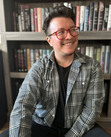Gabe Cole Novoa's Blog, page 48
December 22, 2015
Fixing the First Page Giveaway Winner #18!
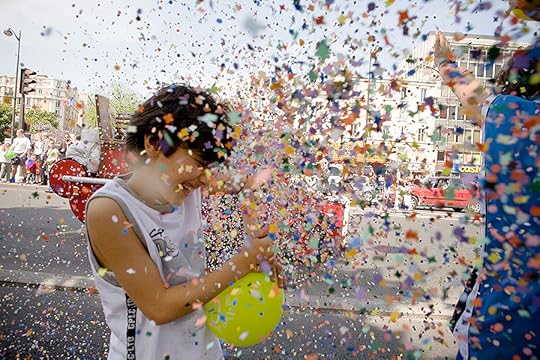 Photo credit: looking4poetry on FlickrSuper quick post before I get the vlog up (which I am currently working on—stay tuned!) to announce the winner of the eighteenth fixing the first page feature giveaway (and final one of 2015)! Yay!
Photo credit: looking4poetry on FlickrSuper quick post before I get the vlog up (which I am currently working on—stay tuned!) to announce the winner of the eighteenth fixing the first page feature giveaway (and final one of 2015)! Yay!*drumroll*
And the winner is…
LUKE MOY!
Woohoo! Congratulations, Luke! Expect an e-mail from me shortly.
Thank you to all you wonderful entrants! If you didn't win, as always, there will be another fixing the first page giveaway next month (the first one of 2016—ahhh!), so keep an eye out! :)





Published on December 22, 2015 04:05
December 21, 2015
Discussion: How Do You Decide Which Books to Read?
 Photo credit: Simon Cocks on FlickrGiven that I currently have 309 books on my Goodreads TBR—and that’s after removing a bunch I’ve realized I’m probably never going to get to—I’ve been thinking about what makes me add a book to my TBR shelf and what makes me prioritize one book over another in terms of deciding what to buy when.
Photo credit: Simon Cocks on FlickrGiven that I currently have 309 books on my Goodreads TBR—and that’s after removing a bunch I’ve realized I’m probably never going to get to—I’ve been thinking about what makes me add a book to my TBR shelf and what makes me prioritize one book over another in terms of deciding what to buy when. I’ve found that especially over the past year or so, books with representation—especially representation I haven’t seen a whole lot of—have become insta-adds. Right now, books with nonbinary characters and chronic illness are a top priority to me as well as characters with other disabilities, but I also keep an eye out for books with non-het protagonists especially in non-Contemporary settings and books that tackle mental illness. I also make note of when books have PoC characters, especially in non-Contemporary settings.
This year, #ownvoices books have also become a top priority for me—and it’s something I’m going to continue to focus on when choosing my reading material for next year.
Of course, all of these elements have to work alongside a very important qualifier, namely that the premise sounds like something I’d really enjoy. I’m not too picky about premise, given that I read across genres pretty widely, but there certainly have been plenty of books out there that sound like they have great representation but the premise just doesn’t sound like something that’d really grab me.
What gets me to move a book from TBR to “bought,” however, is the writing. And the author.
If I’ve already read the author’s books before and really enjoyed them, then I’m more likely to pre-order without sampling. If I haven’t read anything from the author, however, then most of the time I’ll read a sample to see if I like the writing first. If the book doesn’t grab me, then chances are likely I’ll remove it from my TBR.
There have, of course, been exceptions, because this year for the first time I pre-ordered two books without sampling from debut authors because I’d heard so many good things from readers I trust. Luckily, they were both fabulous books so I didn’t regret it.
But this sorting is basically how I decide what goes on my TBR and what I buy. Naturally, I still add (and read) books without representation, but in terms of what I’m going to prioritize first, the books I read usually go through this sorting. And it’s been working out pretty well for me so far.
How do you add and prioritize books on your TBR? And how do you decide what books to buy or borrow next?
Twitter-sized bite:
How do you decide what books to read? Join the discussion on @Ava_Jae's blog. (Click to tweet)





Published on December 21, 2015 04:00
December 18, 2015
Line Editing: What to Look For
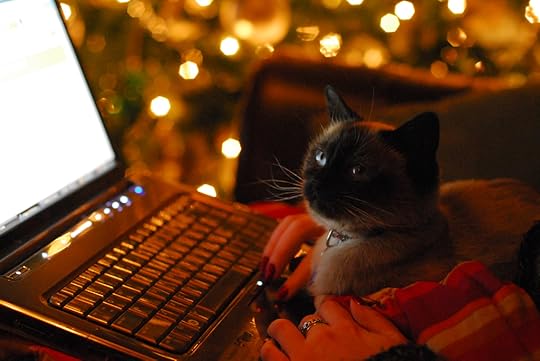 Photo credit: tsuacctnt on FlickrSo now that it is nearly 2016 and Beyond the Red edits are coming to a close, I've entered the stage of editing that once upon a time as a newbie writer I thought was the only thing writers needed to do in terms of editing: line edits.
Photo credit: tsuacctnt on FlickrSo now that it is nearly 2016 and Beyond the Red edits are coming to a close, I've entered the stage of editing that once upon a time as a newbie writer I thought was the only thing writers needed to do in terms of editing: line edits.As I have reiterated here many, many times, my baby writer self was hilariously wrong: line edits should be the last round of edits you do—not the first and only. But! After all the other more significant edits are worked out, there does indeed come a time to focus on the words on the page in a micro-sentence level.
I actually really enjoy line edits, especially when it's someone else's work (though I don't mind it in mine, either). And as I know many of you have enjoyed seeing me line edit with fixing the first page critiques, I thought I'd share some things I look for when line editing.
So in no particular order! Here we go:
Filter phrases. I've written about filter phrases in depth, so I won't rehash everything here. But if you're finding phrases like "I thought," "I saw," "I heard," "I felt," "I remembered," etc., then I highly recommend you take a look at that linked post to learn how to strengthen your writing.
Unintentional repetition. Sometimes, repetition can be used stylistically and can actually be a good thing—which is something that I like to do in my writing. But when it's done unintentionally, it can call attention to the word or phrase that was repeated and distract from the story. I find that reading your work out loud can be a good way to catch accidentally repeated words and phrases—and it's also not a bad idea to keep track of your known word crutches and do a search to hone in on those words specifically. (But remember—don't be afraid of using "said"!)
Confusing/murky sentences. Sometimes a sentence that made sense in your head while you were writing doesn't make sense at all while you're reading. It happens. Writing, for me at least, often happens quickly and when I'm in a zone so to speak, and sometimes when I read back what I've written, I have no idea what my brain was trying to say. Line editing is the time when you clarify these awkward sentences so they don't slow your readers down.
Voice specifications. This is very specific to the manuscript, but line editing is when you want to pay close attention to the voice. Does the character sound the way they should? If you're dealing with multiple POVs, does each character sound distinctive? Does the voice fit the genre and category that you're writing in? Would that specific character really say that specific word? This is when you really want to dig in and ask yourself if what's on the page is really how your character would speak and think. (For more help with voice, check out this post.)
Showing vs. telling. If you've been writing for more than a day, then chances are extremely likely you've heard "show don't tell." When you start line editing, this is where you really want to pay attention to this rule and ask yourself if you're showing when you should be and telling when you need to (because there is a time when telling is important, too!). While reading, make sure you're able to picture the setting and what's happening in the scene based solely on the words on the page (because, remember, readers don't have access to the image you have in your head while writing—all they have are the words). And similarly, when you see something told to the reader, stop and ask yourself if there's a way you could write that more vividly by showing the readers whatever you're telling them.
Interrupted/awkward flow. This is a little harder to describe, but you know it when you see it. When the flow of the writing is interrupted or gets awkward, it's often because of one of the problems above, but it's basically any time you have to slow down while reading because something in the sentence tripped you up. When this happens, it's helpful to reanalyze the sentence to figure out what it was, exactly, that forced you to slow down so that you can fix it.
The point of line edits is, in a sense, to make the writing invisible. Any time a reader stumbles over a word or phrase, or gets confused about something that wasn't explained clearly, they get pulled out of the story to re-analyze the words for clarification. Line editing should help you smooth the reading out, so that readers can stay completely invested in the story without getting distracted by an awkward turn of phrase on the page.
What do you look for when line editing?
Twitter-sized bites:
Not sure where to start with line edits? Author & assistant editor @Ava_Jae shares some elements to look for. (Click to tweet)
What do you look for when line editing? Join the discussion on @Ava_Jae's blog. (Click to tweet)





Published on December 18, 2015 04:00
December 16, 2015
Discussion: What Would You Like to See More Of?
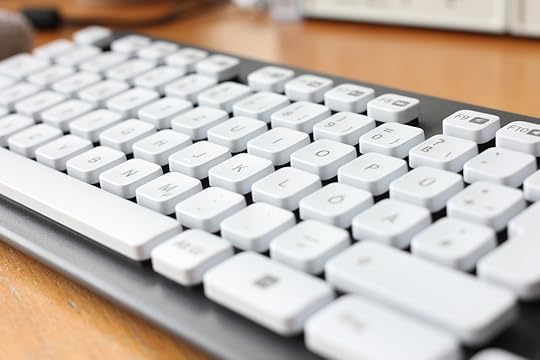 Photo credit: manoftaste.de on FlickrSo as of this moment, including this post, Writability has 832 posts (and they are all organized in the directory). From writing tips, to social media, to publishing, editing, the writing life, character development and more, this blog has had a LOT of posts. A lot a lot. Like, assuming each post is roughly 400 words, that's over 300,000 words worth of posts.
Photo credit: manoftaste.de on FlickrSo as of this moment, including this post, Writability has 832 posts (and they are all organized in the directory). From writing tips, to social media, to publishing, editing, the writing life, character development and more, this blog has had a LOT of posts. A lot a lot. Like, assuming each post is roughly 400 words, that's over 300,000 words worth of posts.And so, as the year is ending and we're looking toward 2016, I'm curious about what topics you guys have found the most useful. What would you like to see more of? Are there any topics I've neglected that you have questions about? Anything you'd like some clarification on, or a different spin on an existing post you'd like to see? Do you have a writing/publishing/blogging-related question that I haven't answered? Now's the time to let me know!
My ears are open. Let me know what you'd like to see more of, and I will do my best to accommodate. :)
So today I'm putting the spotlight on you: what should I write more about going forward?
Twitter-sized bite:
Have a writing, publishing, or book-related question? @Ava_Jae is taking blog topic suggestions! (Click to tweet)





Published on December 16, 2015 04:00
December 15, 2015
Vlog: What Authors Control
When it comes to related-to-the-published-book things, it turns out authors have less control than you might think. From movies to cover design, I break down what authors have influence over.
RELATED LINKS:
How to Get Traditionally PublishedSelf vs. Traditional Publishing
Have you ever been surprised by what authors do and don't control?
Twitter-sized bite:





RELATED LINKS:
How to Get Traditionally PublishedSelf vs. Traditional Publishing
Have you ever been surprised by what authors do and don't control?
Twitter-sized bite:
When it comes to cover design, movies & more, how much control do authors have? @Ava_Jae breaks it down in her vlog. (Click to tweet)





Published on December 15, 2015 04:00
December 14, 2015
Fixing the First Page Giveaway #18!
 Photo credit: katerha on FlickrIncredibly, we are one day away from the halfway point in December! Which means, due to a slightly accelerated/thinking ahead blog schedule because of the holidays, it's time for the last Fixing the First Page giveaway of 2015!
Photo credit: katerha on FlickrIncredibly, we are one day away from the halfway point in December! Which means, due to a slightly accelerated/thinking ahead blog schedule because of the holidays, it's time for the last Fixing the First Page giveaway of 2015!You guys, the next giveaway will be in 2016. 2016 is almost here. I just. How?
Anyway...
For those who’ve missed it in the past, the Fixing the First Page features is a public first 250 word critique. Using the lovely rafflecopter widget, anyone interested in winning a PUBLIC (as in, featured in a post on this blog) first page critique can enter.
For an example of what this critique will look like, here's the last Fixing the First Page post.
Rules!
ONLY the first 250 words will be critiqued (up to finishing the sentence). If you win and send me more, I will crop it myself. No exceptions.
ONLY the first page. I don’t want 250 random words from your manuscript, or from chapter 3. If you win the critique and send me anything other than the first 250 words of your manuscript, I will choose someone else.
I will actually critique it. Here. On the blog. I will say things as nicely as I can, but I do tend to be a little blunt. If you’re not sure you can handle a public critique, then you may want to take some time to think about it before you enter.
Genre restrictions. I'm most experienced with YA & NA, but I will still accept MG and Adult. HOWEVER. If your first page has any erotic content on it, I ask that you don’t enter. I want to be able to post the critique and the first 250 in its entirety without making anyone uncomfortable, and if you win and you enter a page with erotic content, I will choose someone else.
You must have your first page ready. Should you win, you need to be able to submit your first page within 48 hours of my contacting you to let you know you won. If 48 hours pass and I haven’t heard from you, again, I will choose someone else.
You’ll get the most out of this if it isn’t a first draft. Obviously, I have no way of knowing if you’re handing me a first draft (though I will probably suspect because it’s usually not that difficult to tell). I won’t refuse your page if it’s a first draft, but you should know that this critique will likely be of more use if you’ve already had your betas/CPs look over it. Why? Because if you don’t, the critique I give you will probably contain a lot of notes that your betas & CPs could have/would have told you.
There will not be a round 2 (unless you win again in a future contest). I hate to have to say this, but if you win a critique, it’s NOT an invitation to send me a bunch of your revisions. I wish I had the time available to be able to look at revisions, but sadly, I don’t. If you try to break this rule, I will nicely say no, and also remember to choose someone else should you win a second contest. Which would make me sad. :(
So that’s it! If you’re okay with all of the above and would like to enter to be the eighteenth public critique on Writability, do the thing with the rafflecopter widget below. You have until Monday, December 21 at 11:59 EST to enter!
a Rafflecopter giveaway





Published on December 14, 2015 04:00
December 11, 2015
Discussion: What Books Do You Aim to Read Pre-2016?
 Photo credit: what_marty_sees on FlickrSo it’s finals week! Sort of. It’s like, my last full week of class, but also have a final this week (today, in fact!), and also a class and more finals next week. I don’t know. My brain is so tired.
Photo credit: what_marty_sees on FlickrSo it’s finals week! Sort of. It’s like, my last full week of class, but also have a final this week (today, in fact!), and also a class and more finals next week. I don’t know. My brain is so tired.Incredibly, this means we’re running out of days that end in 2015, so I’ve been thinking about what books I want to squeeze in to read by the end of the year. I’ve already beat my Goodreads challenge (yay!) but so many good books and I may actually have time to do extra reading soon. So!
I’m currently reading Carry On and will definitely be finishing that shortly (update: I finished!). The Abyss Surrounds Us is currently on it’s way to me because I am a very lucky human, so I’ll definitely be reading that before the end of the year too. But then! So many options!
I really want to try to squeeze in Six of Crows before the end of the year too. And also Dreamstrider . Or Cinder . Or Storm . Or Cut Both Ways or Bone Gap . (I have all of these books. They are sitting on my TBR bookshelf next to my desk, judging me.)
Realistically, I think I’ll be able to fit in three books after Carry On. Possibly four or even five depending on how much reading time I get on my mini-actual-travel-vacation (I hear I might not have internet, in which case, probably a lot of reading time).
On the other hand, I also hear I’ll be getting new Assassin Creed games around Christmas…
Fun, short post because as I said my brain is tired. But I’d love to hear from you: what are your final reading goals for the end of the year?
Twitter-sized bite:
What are your final reading goals for the end of the year? Join the discussion on @Ava_Jae's blog. (Click to tweet)





Published on December 11, 2015 04:00
December 9, 2015
The Problem with Superpowered Disabled Characters
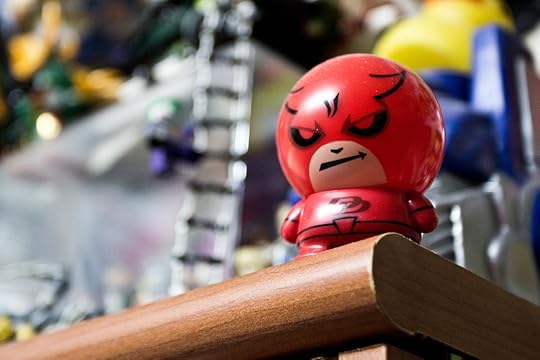 Photo credit: joo0ey on FlickrSo after responding to a long comment on my Lack of Chronic Illness Rep in YA post, I tweeted a little about my frustration with some of the counter-arguments brought up in opposition to the post, including that vampirism/lycanthropy could be considered chronic illnesses (which, by the way, I disagree with for many, many reasons).
Photo credit: joo0ey on FlickrSo after responding to a long comment on my Lack of Chronic Illness Rep in YA post, I tweeted a little about my frustration with some of the counter-arguments brought up in opposition to the post, including that vampirism/lycanthropy could be considered chronic illnesses (which, by the way, I disagree with for many, many reasons).This post isn’t about that, exactly, but while I was tweeting about it, @Holly1994 brought up a point that really resonated with me, in that she compared claiming vampirism/lycanthropy is a chronic illness is similar to all those blind characters out there who have superpowers that totally negate their blindness.
Which…got me thinking about how so very common it is for disabled characters to have superpowers that totally erase their disability.
The biggest and easiest example here, of course, is Daredevil—a character who is blind, but whose superpowered senses are so enhanced that he can see through sound, sort of, so he’s blind but…not really. He can still navigate with little difficulty and fight crime and be a total badass due to his ability to sense things around him in precise detail.
I looked up some other examples and found quite a few (by the way, some of the source links have super ableist language, JSYK):
Dr. Mid-Nite: blinded by an explosion, but can see in pitch blackness for some reason, so he wears special super-dark goggles so he can see during the day—and fight crime at night.
Captain Marvel, Jr: character who has some kind of physical disability that makes mobility difficult, but can transform into an able-bodied superhero to fight crime before transforming back into his non-superhero, disabled self.
Thor: Apparently in the 1962 comics, Thor also had the transform thing: his “human” self needed a mobility aid to get around (a cane) because Odin wanted to teach him a lesson in humility (which is majorly problematic for entirely different reasons, but I digress), but he could transform into Thor, who is able-bodied, to be a hero.
Iron Man: in the comics, Tony Stark is injured and becomes paraplegic—but he can still move his legs and fly around as Iron Man in his suit, and apparently the comic writers got tired of writing him as disabled and cured him with a biochip implant.
Komodo: A bilateral amputee graduate student who stole The Lizard’s (from Spider-Man) serum to regrow her legs and became a trainee Avenger.
Doctor Strange: apparently a car accident resulted in nerve damage that caused the loss of use of his hands—until he found magic and became a sorcerer. (EDIT: I've been told that possibly Doctor Strange doesn't need use of his hands to perform magic because...it requires less dexterity or something? I'm not familiar with the story, so not sure, but possibly this might be okay.)
I’m sure there are other examples, but you get the idea.
The problem here is exactly what I mentioned above: their superpowers directly negate their disabilities. Physically disabled characters are suddenly able-bodied again, because, apparently, they couldn’t be superheroes otherwise.
Of course, there are examples of superheroes who’s abilities don’t negate their disability–Professor X, for example, who is paraplegic and telepathic—but his telepathy doesn’t make him able to walk again. And Hawkeye who (eventually, at least) is deaf and learns sign language to better communicate—but his supernaturally good aim doesn’t negate the fact that he can’t hear.
Right now at least, I don’t personally have a problem with disabled superheroes whose powers don’t erase their disability. I think it’s cool that many disabled kids may be able to see a character like them who is superpowered and badass but still has to deal with the same difficulties they do with their disability.
However, the narrative of superpower-erasing-disability is so very common, and that is a problem. Because the implication is the only way to make this disabled character awesome is to make him able-bodied. Because people then point to those characters and say there’s your disability representation—you have enough representation already. Because they are, in essence, saying what makes those characters cool is the way they can erase their disability with superpowers.
And that’s not fair. Because it totally erases difficulties disabled people have to wrestle with while still claiming to be representative.
We need more disabled characters—and I want to see them save the world, and hunt down killers, and go to magical schools, and lead revolutions. I want to see them be totally awesome, and get the hot love interest, and be heroes.
But I also want to see them struggle with their disability. I want to see them get frustrated, and deal with ableism, and have bad days and good days. I want to see them take medication, and if their condition is degenerative I want to see them get worse, and be uncertain about the future, and not have a good answer for what life will be like in five, ten years. I want them to deal with their disability in real, tangible ways. I want it to affect their everyday lives, I want their disability to be visible and invisible, and I want it to matter.
But I also want to see them live. I want to see them get by just fine, and be the hero, and I want them to be an inspiration because they do incredible things—not because they’re disabled—and I want their disability to be normalized.
Everyone deserves to see themselves represented, and for the disabled, that means in a way that doesn’t totally erase everything that makes them disabled to begin with. Everyone deserves to see themselves as heroes without being told the only way to do so is to erase their reality.
Twitter-sized bites:
What's the problem with superpowers erasing disabilities? @Ava_Jae breaks it down. (Click to tweet)
"Everyone deserves to see themselves as heroes without...eras[ing] their reality." (Click to tweet)





Published on December 09, 2015 04:00
December 8, 2015
Vlog: How to Pick Your Next Book Idea
Choosing your next book idea can be difficult when you have several ideas competing for your attention. Today I'm sharing some tips for picking (and sticking with) the right one.
RELATED LINKS:
On Writing the Perfect Project (vlog)How I Plot (vlog)How to Finish a WIP (vlog)How to Get Book Ideas (vlog)Write For Yourself First (vlog)Is Your Idea Novel-Worthy?Discussion: Are You an Idea-Generating Machine?
How do you choose a book idea?
Twitter-sized bites:





RELATED LINKS:
On Writing the Perfect Project (vlog)How I Plot (vlog)How to Finish a WIP (vlog)How to Get Book Ideas (vlog)Write For Yourself First (vlog)Is Your Idea Novel-Worthy?Discussion: Are You an Idea-Generating Machine?
How do you choose a book idea?
Twitter-sized bites:
Have many WIP ideas but don't know which to write first? @Ava_Jae vlogs about deciding which idea to pick. (Click to tweet)
On choosing a WIP idea, seeing it through, and resisting Shiny New Idea Syndrome. #vlog (Click to tweet)





Published on December 08, 2015 04:00
December 7, 2015
Is Twitter Still Worth It?
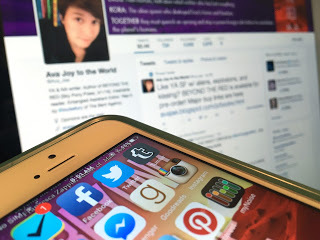 Photo credit: mineSo I’ve talked about Twitter here on the blog quite a bit, largely because Twitter has, quite literally, changed my life. Twitter was the very first social media account I opened as a writer. It was what gave me the courage to start a blog, and eventually a tumblr, Facebook fan page, Pinterest, Instagram, YouTube and more.
Photo credit: mineSo I’ve talked about Twitter here on the blog quite a bit, largely because Twitter has, quite literally, changed my life. Twitter was the very first social media account I opened as a writer. It was what gave me the courage to start a blog, and eventually a tumblr, Facebook fan page, Pinterest, Instagram, YouTube and more. Twitter is where I’ve met so many friends, both who I’ve now met in person and haven’t, who I care for so much. Twitter is where I first found the blog contest that eventually got me my agent, where I landed my first and second internships—which helped me to decide to change my major and led to a promotion—where I’ve connected with so many wonderful writers, bloggers, readers, and industry people. And I’m so grateful for those connections and the reach Twitter has given me.
However, Twitter has been changing.
Over the course of the past year, I’ve seen a ton of important Discussions take over Twitter. Some have been somewhat productive, some have not. All were justified for one reason or another. The Discussions have called out racism, sexism, anti-Semitism, Islamophobia, ableism, transphobia, homophobia, bi-erasure/biphobia, whitewashing and so much more. The Discussions have brought attention to problems in the YA community, in certain books, in the publishing industry as a whole. Discussions have said we need to talk about this and we can’t keep ignoring this and this isn’t acceptable and they are important, they are all so important and necessary.
But alongside those Discussions has come a change in online climate. In the way we speak to each other. In the way we respect (or don’t) others opinions. In the way many feel the need to disagree with every little thing someone says—even the most mundane of opinions. In the way some feel it’s okay to jump into someone’s mentions to tell them they’re wrong when they weren't asking for an opinion in the first place.
But it’s also in the way people treat women who Share Opinions and men who Share Opinions. It’s in the way some who say Regrettable Things are pandered to and those who talk about why those Things are Regrettable get attacked under the guise of Be Kind. It’s in the way women—and especially women who are marginalized—are frequently viciously attacked for saying what they believe, for talking about the way they’ve been marginalized, for saying This Isn’t Okay. It’s in the way men—especially white men—who say the same thing are applauded for being So Brave.
It’s also in the way I’ve seen outspoken female friends chased off Twitter. It’s in the way many automatically assume Bad Faith. It’s in the way Twitter, which used to be a Safe Space, has become something else, something not always safe, something that sometimes is stressful and terrifying—something that often feels like walking on thin ice over a deep lake.
And it’s also in the way I have to pause and think before saying anything even remotely opinionated—because, invariably, a man I don’t know will appear in my mentions to tell me I’m wrong. It’s in the way I have to pause and think before retweeting something important a friend—especially a female friend—is saying, because I might inadvertently expose them to attackers—because I might inadvertently expose myself to attackers.
It’s in the way, even writing this post, I know I may have to brace myself. From commenters. From people on Twitter. From places will people will go out of the way to say I’m overreacting, to say I’m exaggerating, to say I’m hypersensitive, need a thicker skin, should grow up, am wrong.
It’s also in the way I’ve quietly been stepping back from Discussions on Twitter. It’s in the way I hesitate to say something important if it’s going to take me more than a few tweets. It’s in the way I’ve learned to ask is this okay to retweet when my friends say something important—something that could lead to negativity in their mentions. It’s in the way I’ve had to ask myself do I have enough energy to talk about this? Will this Discussion be worth it? It’s in the way I’ve sometimes closed Twitter because the answer is no.
Look. I’m not saying Twitter is a volatile place all the time. I’m not saying one group—whether based off gender, race, or something else—is the problem all the time, or even most of the time. I’m not saying I don’t like Twitter anymore, or it hasn’t been wonderful at times.
What I am saying is it’s changing. What I am saying is the way I use it has been changing, one step at a time. What I am saying is it isn’t as safe as it used to be—not really—and I don’t know if it can or will get better. What I am saying is there has been Good and Bad to come out of this change, and acknowledging it is important.
So here’s what I’m going to do.
I’m going to keep using Twitter, but the way I use it will probably still change.
I’m going to keep participating in Discussions—but only when I have the energy to deal with the potential backlash.
I’m going to look out for my friends. I’m going to reach out to them when I see they’re dealing with backlash. I’m going to share what they say as long as they want me to, and between Discussions I’m going to enjoy Twitter like I did before. With books. And fan excitement. And writing thoughts. And random updates.
I’m also going to take care of myself. And listen. And do my best to try to be a positive force online. And I’ll probably mess up. And I’ll probably regret joining or starting a Discussion. And I’ll probably have to step away sometimes.
But then I’ll try to learn so next time, I can do better. And I’ll do everything I can to enjoy the incredible bookish community that I’ve so come to love.
How about you?
Twitter-sized bite:
With the online climate changing, @Ava_Jae asks if Twitter is still worth it—what do you think? (Click to tweet)





Published on December 07, 2015 04:00

